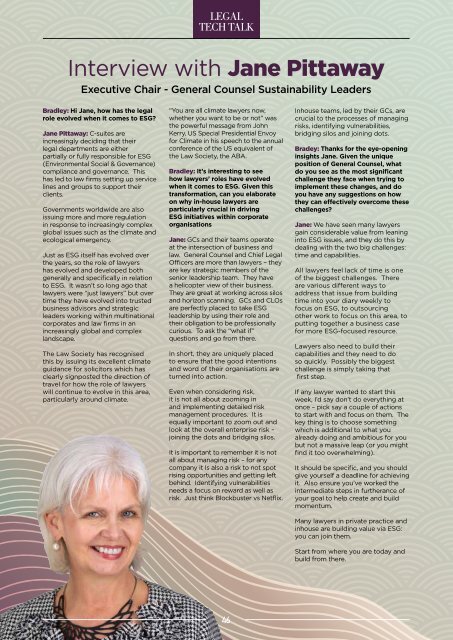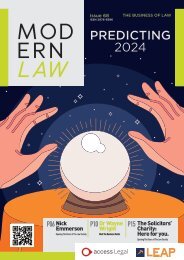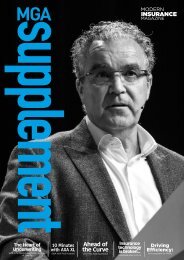Modern Law Magazine Issue 67
You also want an ePaper? Increase the reach of your titles
YUMPU automatically turns print PDFs into web optimized ePapers that Google loves.
LEGAL<br />
TECH TALK<br />
Interview with Jane Pittaway<br />
Executive Chair - General Counsel Sustainability Leaders<br />
LEGAL<br />
TECH TALK<br />
Interview with Christine Uri<br />
ESG for In-house Counsel<br />
Bradley: Hi Jane, how has the legal<br />
role evolved when it comes to ESG?<br />
Jane Pittaway: C-suites are<br />
increasingly deciding that their<br />
legal departments are either<br />
partially or fully responsible for ESG<br />
(Environmental Social & Governance)<br />
compliance and governance. This<br />
has led to law firms setting up service<br />
lines and groups to support their<br />
clients.<br />
Governments worldwide are also<br />
issuing more and more regulation<br />
in response to increasingly complex<br />
global issues such as the climate and<br />
ecological emergency.<br />
Just as ESG itself has evolved over<br />
the years, so the role of lawyers<br />
has evolved and developed both<br />
generally and specifically in relation<br />
to ESG. It wasn’t so long ago that<br />
lawyers were “just lawyers” but over<br />
time they have evolved into trusted<br />
business advisors and strategic<br />
leaders working within multinational<br />
corporates and law firms in an<br />
increasingly global and complex<br />
landscape.<br />
The <strong>Law</strong> Society has recognised<br />
this by issuing its excellent climate<br />
guidance for solicitors which has<br />
clearly signposted the direction of<br />
travel for how the role of lawyers<br />
will continue to evolve in this area,<br />
particularly around climate.<br />
“You are all climate lawyers now,<br />
whether you want to be or not” was<br />
the powerful message from John<br />
Kerry, US Special Presidential Envoy<br />
for Climate in his speech to the annual<br />
conference of the US equivalent of<br />
the <strong>Law</strong> Society, the ABA.<br />
Bradley: It’s interesting to see<br />
how lawyers’ roles have evolved<br />
when it comes to ESG. Given this<br />
transformation, can you elaborate<br />
on why in-house lawyers are<br />
particularly crucial in driving<br />
ESG initiatives within corporate<br />
organisations<br />
Jane: GCs and their teams operate<br />
at the intersection of business and<br />
law. General Counsel and Chief Legal<br />
Officers are more than lawyers – they<br />
are key strategic members of the<br />
senior leadership team. They have<br />
a helicopter view of their business.<br />
They are great at working across silos<br />
and horizon scanning. GCs and CLOs<br />
are perfectly placed to take ESG<br />
leadership by using their role and<br />
their obligation to be professionally<br />
curious. To ask the “what if”<br />
questions and go from there.<br />
In short, they are uniquely placed<br />
to ensure that the good intentions<br />
and word of their organisations are<br />
turned into action.<br />
Even when considering risk,<br />
it is not all about zooming in<br />
and implementing detailed risk<br />
management procedures. It is<br />
equally important to zoom out and<br />
look at the overall enterprise risk –<br />
joining the dots and bridging silos.<br />
It is important to remember it is not<br />
all about managing risk – for any<br />
company it Is also a risk to not spot<br />
rising opportunities and getting left<br />
behind. Identifying vulnerabilities<br />
needs a focus on reward as well as<br />
risk. Just think Blockbuster vs Netflix.<br />
Inhouse teams, led by their GCs, are<br />
crucial to the processes of managing<br />
risks, identifying vulnerabilities,<br />
bridging silos and joining dots.<br />
Bradey: Thanks for the eye-opening<br />
insights Jane. Given the unique<br />
position of General Counsel, what<br />
do you see as the most significant<br />
challenge they face when trying to<br />
implement these changes, and do<br />
you have any suggestions on how<br />
they can effectively overcome these<br />
challenges?<br />
Jane: We have seen many lawyers<br />
gain considerable value from leaning<br />
into ESG issues, and they do this by<br />
dealing with the two big challenges:<br />
time and capabilities.<br />
All lawyers feel lack of time is one<br />
of the biggest challenges. There<br />
are various different ways to<br />
address that issue from building<br />
time into your diary weekly to<br />
focus on ESG, to outsourcing<br />
other work to focus on this area, to<br />
putting together a business case<br />
for more ESG-focused resource.<br />
<strong>Law</strong>yers also need to build their<br />
capabilities and they need to do<br />
so quickly. Possibly the biggest<br />
challenge is simply taking that<br />
first step.<br />
If any lawyer wanted to start this<br />
week, I’d say don’t do everything at<br />
once – pick say a couple of actions<br />
to start with and focus on them. The<br />
key thing is to choose something<br />
which is additional to what you<br />
already doing and ambitious for you<br />
but not a massive leap (or you might<br />
find it too overwhelming).<br />
It should be specific, and you should<br />
give yourself a deadline for achieving<br />
it. Also ensure you’ve worked the<br />
intermediate steps in furtherance of<br />
your goal to help create and build<br />
momentum.<br />
Many lawyers in private practice and<br />
inhouse are building value via ESG:<br />
you can join them.<br />
Start from where you are today and<br />
build from there.<br />
Bradley: Hi Christine, how has<br />
the legal role evolved with respect<br />
to ESG?<br />
Christine: It is an area that is rapidly<br />
changing. Traditionally, in-house<br />
counsel has not been heavily involved<br />
in the environmental aspects of an<br />
organisation. These matters were<br />
typically handled by sustainability<br />
experts, facilities personnel, or other<br />
individuals within the organisation.<br />
However, there is a growing body<br />
of regulations coming into effect,<br />
such as the Corporate Sustainability<br />
Reporting Directive (CSRD) in<br />
Europe. Additionally, there is an<br />
increase in ESG-related litigation,<br />
particularly greenwashing litigation.<br />
The UK is a hotbed for such litigation,<br />
as evidenced by the recent cases<br />
against Shell Oil. As ESG becomes a<br />
more prominent legal topic, general<br />
counsel are being forced to get<br />
involved, whether they want to or not.<br />
In short, the legal role in ESG has<br />
evolved from a back-office support<br />
function to a front-line advisory<br />
role. General counsels are now<br />
responsible for ensuring that their<br />
organisations are compliant with<br />
ESG regulations and that they<br />
are not exposed to ESG-related<br />
litigation. This requires a deep<br />
understanding of ESG issues, as well<br />
as the ability to advise on how to<br />
mitigate ESG risks.<br />
Bradley: Could you elaborate<br />
on the key role general counsel<br />
play in driving ESG initiatives for<br />
corporates, and what specific<br />
responsibilities they should<br />
undertake in this area.<br />
Christine: Absolutely, the role<br />
of in-house lawyers and general<br />
counsel in ESG initiatives is pretty<br />
significant. It can vary depending on<br />
their leadership style. Some general<br />
counsel, either because they’re really<br />
into ESG or due to their organization’s<br />
structure, take ESG and sustainability<br />
under their wing. Around 15% of<br />
general counsel do this, according<br />
to a study by Corporate Council<br />
and Morrison Forster. For example,<br />
when I was the Chief Legal and<br />
Sustainability Officer, I did both legal<br />
and sustainability work.<br />
In this setup, general counsel<br />
needs to have a strong team of<br />
sustainability experts to make<br />
it work. But the more common<br />
approach is to collaborate with<br />
departments leading sustainability<br />
and ESG efforts, which could be<br />
in finance, strategy, or elsewhere.<br />
Regardless of where it falls, general<br />
counsel makes sure legal aspects<br />
align with ESG goals.<br />
They deal with various legal aspects<br />
of ESG, like keeping an eye on new<br />
regulations and getting the company<br />
ready to comply. Supplier contracts<br />
are a big deal because many<br />
sustainability rules require data from<br />
suppliers. Legal teams need to update<br />
contracts for this and ensure suppliers<br />
follow ethical practices, like labour<br />
and human rights policies. In Europe,<br />
they’re pretty strict about this.<br />
Managing the supply chain is a big<br />
task, especially with lots of contracts<br />
to handle. And there’s also the issue<br />
of “greenwashing” – making sure<br />
a company’s sustainability claims<br />
are legit. I’d suggest reviewing the<br />
company website and press releases<br />
carefully if a General Counsel asked<br />
me about this. Sometimes, statements<br />
get made without full consideration,<br />
which can lead to legal troubles.<br />
Nowadays, activists are keeping<br />
a close eye on companies’<br />
sustainability claims, and it’s<br />
important to review all statements<br />
for accuracy and to avoid legal risks.<br />
Even true bold claims can bring their<br />
own risks, so you’ve got to think<br />
them through.<br />
Bradley: Thanks for shedding a light<br />
on this Christine. Can you delve<br />
deeper into the key challenges<br />
faced by General Counsels when<br />
implementing these changes within<br />
their organisations?<br />
Christine: Sure, Bradley. The<br />
paramount challenge for General<br />
Counsels in this context is the<br />
deeply cross-functional nature<br />
of ESG and sustainability<br />
initiatives. While General Counsels<br />
can lead and offer guidance<br />
on these initiatives, bringing<br />
them to fruition demands<br />
collaboration and commitment<br />
from various departments across<br />
the organisation. This requires<br />
engagement from operations,<br />
finance, marketing, sales, product<br />
development, and, of course, the<br />
sustainability team if one exists. In<br />
essence, it’s a large-scale crossfunctional<br />
project that necessitates<br />
bringing together stakeholders<br />
who may not directly report to the<br />
General Counsel but are integral to<br />
the implementation process.<br />
Another significant hurdle is the<br />
matter of budgeting. Implementing<br />
ESG and sustainability initiatives<br />
typically requires financial resources.<br />
Thus, General Counsels must<br />
navigate the process of presenting<br />
budget proposals to the executive<br />
team and securing the necessary<br />
financial support for these<br />
endeavours. Finding ways to allocate<br />
the appropriate budget becomes an<br />
essential part of the challenge.<br />
So, in summary, the most formidable<br />
obstacles lie in garnering crossfunctional<br />
support and obtaining the<br />
required budgetary approvals.<br />
46 47
















